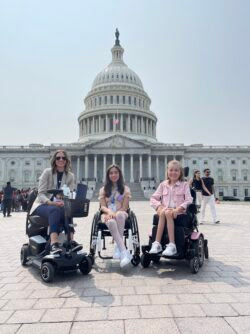NEVER BACKING
DOWN
This week, my blog received its one
millionth unique visitor.
I have been blogging daily for more
than a decade.
Sometimes I have posted beautiful
photos from exotic travel.
Certainly this space has served as a
bully pulpit to scold lousy government services and terrible companies.
A few times, I have shared photos of
my cats – or tragically, a tribute to one who went over the Rainbow Bridge.
But more than 90 percent of my posts
are related to disability advocacy.
Most of those point out flaws in the
built environment.
With all due respect, our planners,
architects, engineers, builders and municipalities that regulate them have had
more than a third of a century under the Americans with Disabilities Act (ADA)
to get it right.
But the vast majority continue to push
back, resist and even go to court to try to get out of the responsibility of observing
federal civil rights legislation that guarantees equal access for people with disabilities.
Hundreds of local governments – and related
transit, redevelopment and similar agencies – still design sidewalks, parks,
buildings, transit systems, airports and much of the built environment in ways
that isolate and dehumanized people with disabilities.
Sadly, with a plethora of lawsuits
against the ADA and Section 504 of the Rehabilitation Act of 1973, a stacked Supreme
Court may strip away basic dignity and independence of people with
disabilities.
In case you are wondering, the CDC has
documented that one in four people experience disability in their lifetime.
That is more than 85 million Americans. Globally, the WHO has recognized that
there are far more than 1 billion people with disabilities.
Not only is a level playing field a
basic human right. But it also makes economic sense.
In addition to the staggering loss of
dignity and quality of life, it costs trillions to warehouse people instead of
mainstreaming them.
It costs dimes on the dollar to create
inclusive spaces and places.
Once that is done, the rampant under-
and unemployment of people with disabilities can become a thing of the past.
Catastrophically, our White House,
Senate and Congress and far too many governors and state legislators --
seem hellbent on reducing the inclusion gained under nearly 35 years of the ADA.
Diversity, Equity and Inclusion is the
very definition of a Democracy – it is the core fiber of what it means to be in
the United States. But the savage right wing would like to reframe DEI as
something as loathsome as fascism.
This blog will never back down from championing
DEI, especially in the lens of disability.
Not even if it costs me clients and
work.
Not even if it places me in the
crosshairs of an authoritarian government goose stepping its way toward a Nazi
police state.
I will risk my nest egg, career and
freedom – defending my right to underscore ableism and other treacherous acts
of hatred toward the disability community.
Give me the liberty to be an ally, or
give me death.




























